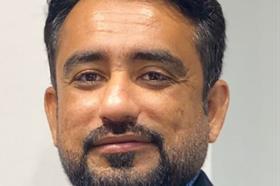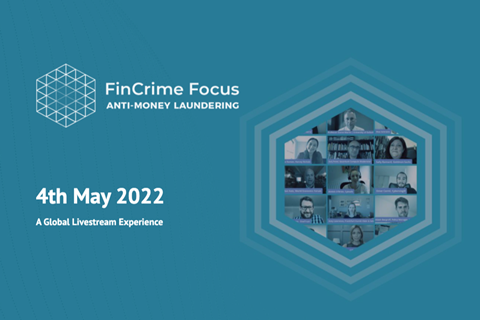Audiences tuning into FinCrime: Anti-Money Laundering this week will be able to hear the views of compliance specialist, Talal Shoukat.

Compliance Manager, MLRO at Gulf Exchange, Talal Shoukat will be appearing on a panel at FinCrime: Anti-Money Laundering to comment on AML/KYC programmes, providing insight into how strategies can satisfy complex regulatory requirements.
The panel debate sits within a content-rich agenda at FinCrime: Anti-Money Laudering – a one-day livestreaming experience taking place on Wednesday May 4.
Global audiences will be taken to the heart of the financial crime conversation, as over 20 thought leaders and subject matter experts give their thoughts on how organisations are taking the fight to the financial criminals as momentous world events unfold.
We spoke to Talal Shoukat about his professional journey so far, and to get an introduction into the complexities of successful AML/KYC compliance programmes in 2022.
Could you outline your career pathway to date?
I am an experienced professional with a background in multiple Financial Institutions (FIs) ranging from large global banks and money service businesses committed to protect FIs against financial crime. I currently work as Compliance Manager and MLRO in a local Money Service Business (MSB) in Qatar.
Before joining Compliance & MLRO, I was part of the Regulatory Compliance, Identity Compliance Management and Customer Onboarding teams. These teams managed compliance to regulatory requirements, compliance checks and quality assurance of compliance programs on behalf of FIs.
In addition to my CAMS & CCM designations, I am holder of Charter Banker Diploma from Charter Institute UK and Qualified Associate from Institute of Bankers.
Alongside the Compliance Manager & MLRO function, I am an Accredited Trainer from Global Compliance Institute (GCI). I also deliver training in the AML/CFT domain globally and assist professionals working to pass global certifications.
Finally, I am a learner and a contributor in order to play my role effectively in mitigating ML/TF risk at the global scale in the financial crime domain.
What are the main ingredients of a successful global AML/KYC compliance programme?
If we discuss a successful global AML/KYC compliance programme, it is based on successful enterprise-wide risk assessments which assesse an FIs inherent ML/TF risks; the effectiveness of the control environment designed to mitigate those risks, and the need to implement additional measures to manage residual risks where necessary.
The areas mentioned below comprise the key elements driving a successful AML/KYC programme:
Responsibility of the board and top management
The board of a financial institution is responsible for approving the policies, procedures, systems and controls necessary to ensure the effective prevention of ML/TF. Board and Senior Management need to set the tone from the top in order to create compliance culture with in organisation.
Know your customer procedures
A financial institution must know each of its customers to the extent appropriate to the customer’s risk profile.
Effective reporting
A financial institution must have effective measures in place to ensure internal and external reporting whenever ML/TF is known or suspected. This derives from implementing an effective AML/CFT system to highlight red flags related to AML/CFT.
High standard screening and appropriate training
A financial institution must have adequate screening procedures to ensure high standards when appointing or employing officers. Employees and must have appropriate ongoing AML/CFT training programme for its officers and employees.
Evidence of compliance
A financial institution must be able to provide documentary evidence of its compliance with local regulations and international standards related to AML/CFT.
In what ways does a business benefit from having an effective AML/KYC compliance programme?
- Effective AML/KYC compliance programmes are a powerful part of dealing with money laundering.
- An effective AML / CFT framework increases its deterrence for crime and allows a business to minimise its risk.
- Every AML / CFT step taken in business is of great importance.
An AML compliance programme allows businesses to easily comply with regulations, thus protecting themselves against risks and avoiding regulatory penalties. Anti-money laundering regulations, audits, and penalties are increasing globally.
As a result of an effective AML/CFT programme design, financial institutions are protected from such hefty penalties, and efficient programmes enhance customer experience, which in turn increases customer retention.
What are the main challenges facing organisations as they push to improve their AML/KYC compliance programmes?
Banks and FIs are facing serious AML compliance challenges that can be typically attributed to faulty mitigation approaches. Firms that fail to prevent laundering tend to pay a heavy price in the form of declining revenues, customer dissatisfaction, huge penalties, loss of reputation, and fall in stock prices.
To comply with AML regulations, banks around the world use various technology-based products and solutions. The Financial Action Task Force (FATF), an inter-governmental body with 37 members the world over, has framed a set of regulations that is recognised as an international framework of AML standards. These AML regulations help detect, report, and prevent suspicious activities at financial institutions.
Banks face several challenges in managing risks involved in assessing the current AML status and identifying vulnerabilities. Disparate transactions and increasing complexities of fraud and cybercrimes compound the situation. To address these challenges, banks need to ensure data protection, detect fraud in time, and prioritise compliance with the FATF regulations.

Don’t miss Talal Shoukat speaking exclusively at FinCrime Focus: Anti-Money Laundering in the panel debate: “Key Elements of an Effective Global AML/KYC Compliance Programme in 2022.”
Also on the panel:
- Sujata Dasgupta, Global Head - Financial Crime Compliance Advisory, Tata Consultancy Services
- Devraj Basu, Senior Lecturer in Finance, Accounting and Finance Department, Strathclyde Business School
Session time: 13:30-14:20 PM BST
Date: Wednesday 4th May 2022












No comments yet